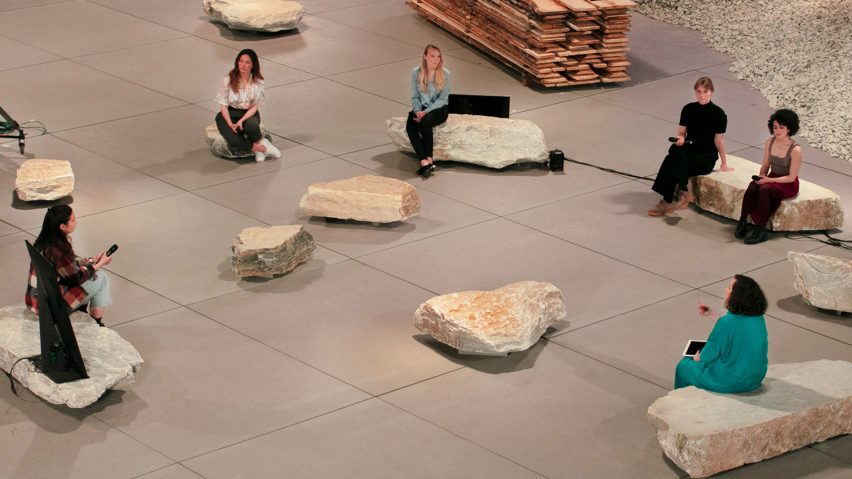Dezeen promotion: new approaches to architecture, landscaping and interior design were discussed at the Archipelago: Architectures for the Multiverse conference in Geneva.
The three-day event, which was broadcast online, took place from 6 to 8 May. It was organised by the Geneva School of Art and Design (HEAD) and the Geneva School of Engineering, Architecture and Landscape (HEPIA).
Titled Archipelago: Architectures for the Multiverse, the hybrid conference brought in-person and online participants from the architecture, interior design and landscape design industries together to discuss intersections across the disciplines through performances, film screenings, talks and workshops.
The first day of talks was titled: Do We Need to Build?
The Archipelago advisory board: Sepake Angiama, Marina Otero, Catherine Ince, Natacha Guillaumont, Nicolas Pham, Matevz Celik, Lev Bratishenko, Anton Belov, Javier Fernandez Contreras, discussed current design practice, focusing on newly visible methodologies.
The task challenged the board to question the assumption that architects, landscape designers and interior designers need to produce physical material.
The theme for the second day was: Understories – What Remains Hidden in Plain Sight?
It focussed on under-represented systems and knowledge across design disciplines via a series of four key conversations.
The first session, titled Territories of Intervention, invited Daniel Zamarbide, Charlotte Truwant, and Justinien Tribillon to investigate Geneva's urban context and borders. Moderated by Meriem Chabani, it aimed to question "how the city is entangled in larger myths of nationality and place," the organisers said.
This was followed by a conversation titled Extractive Systems, in which Sofia Pia Belenky, Francesco Sebregondi, Manijeh Verghese "sought to unearth systems and traces – capitalist, imperialist, extractivist – exposing and challenging forms of embedded exploitation".
The third session, titled Other Stories, was moderated by Ala Tannir and brought together Silvia Franceschini, Cruz Garcia and Nathalie Frankowski from Wai Architecture Think-Tank and Dele Adeyemo, exploring "narratives within architecture, landscape and interior design that are traditionally positioned at the margin".
The final conversation, titled Planetary Narratives, was moderated by Elise Misao Hunchuck and gathered Jane Mah Hutton, Marco Ferrari, and Rania Ghosn. It "considered stories that play out at a global scale, ones that implicate multiple materials' flow across time and space," the organisers said.
A selection of films exploring capitalism, the climate crisis, indigenous knowledge and colonialism, by Dele Adeyemo, Design Earth and Joar Nango were also presented.
The theme for the third day was: Interdependency – New Disciplinary Narratives.
The first session, titled Kinship and Advocacy, gathered Adrian Lahoud, Esther Choi, Charlotte Malterre-Barther and Marie-Louise Roberts to question how expectations and boundaries in design and architectural disciplines change when collaboration and kinship are placed at the forefront of the design process.
"Panellists related personal experience to their work and discussed the role that shared ritual plays in fostering kinship," the organisers said.
The second conversation of the day, titled Working With, explored "how practitioners are changing their working ways to offer new possibilities for interdisciplinary exchange." The conversation gathered Céline Baumann, Mathias Echanove from urbz, and members of Geneva-based Collectif Galta.
The third session, titled New Roles, New Practices, "sought to build upon the previous three days of insights to imagine new paths for architects, landscape architects, and interior designers," the organisers said. The conversation was moderated by Ala Tannir and brought together Pooja Agrawal, Ann Lui and Mariana Pestana.
The conference concluded with a roundtable discussion that gathered the event's moderators and students at the organizing schools to explore the creation of new pathways within educational institutions to benefit future designers.
The three days of discussions took place alongside custom-built scenography designed and produced from locally sourced wood and stone by faculty and students from HEPIA and HEAD. After the conference, the structures were dismantled and the materials were returned to their original place.
The talks programme was also enhanced with digital workshops for students selected as part of an open call for participants.
"The workshop programme happened online – with sessions exploring the conflated realms of physical and digital realities; the creation of new worldviews through maintenance and repair; and new ways to co-exist and care for each other from the human to the microbial level," the organisers said.
"Archipelago could not have been the intense and fruitful experience it was without the participation of all of the panellists, workshop leaders, filmmakers, and moderators both in-person and virtually," the organisers said.
"It could not have happened without the efforts of the production team, the scenography team, and the facilities staff at the Geneva School of Art and Design."
"The Archipelago Team would also like to thank the students and faculty members who were the foundation of the event since its conception."
For more information on the event, visit The Archipelago: Architectures for the Multiverse's website.
Partnership content
This article was written by Dezeen for HEAD and HEPIA as part of a partnership. Find out more about Dezeen partnership content here.

